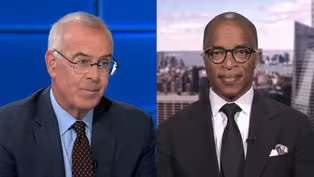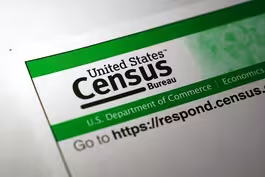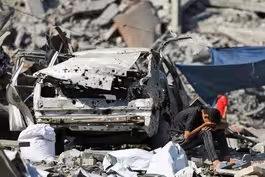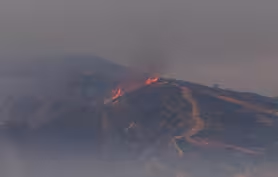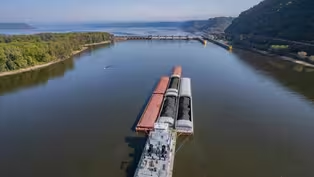
Recent natural disasters highlight Trump's changes to FEMA
Clip: 8/8/2025 | 6m 31sVideo has Closed Captions
Federal response to recent disasters reveals impact of Trump's changes to FEMA
Since taking office, President Trump has called for the elimination of the Federal Emergency Management Agency, suggesting it could be dismantled as soon as December. Lately, his team has backed away from that idea, but there are still major changes underway and concerns that FEMA's response is at times politicized. Stephanie Sy looks at the changes and what they mean for disaster preparedness.
Problems playing video? | Closed Captioning Feedback
Problems playing video? | Closed Captioning Feedback
Major corporate funding for the PBS News Hour is provided by BDO, BNSF, Consumer Cellular, American Cruise Lines, and Raymond James. Funding for the PBS NewsHour Weekend is provided by...

Recent natural disasters highlight Trump's changes to FEMA
Clip: 8/8/2025 | 6m 31sVideo has Closed Captions
Since taking office, President Trump has called for the elimination of the Federal Emergency Management Agency, suggesting it could be dismantled as soon as December. Lately, his team has backed away from that idea, but there are still major changes underway and concerns that FEMA's response is at times politicized. Stephanie Sy looks at the changes and what they mean for disaster preparedness.
Problems playing video? | Closed Captioning Feedback
How to Watch PBS News Hour
PBS News Hour is available to stream on pbs.org and the free PBS App, available on iPhone, Apple TV, Android TV, Android smartphones, Amazon Fire TV, Amazon Fire Tablet, Roku, Samsung Smart TV, and Vizio.
Providing Support for PBS.org
Learn Moreabout PBS online sponsorshipGEOFF BENNETT: Since taking office, President Trump has called for the elimination of the Federal Emergency Management Agency, or FEMA, suggesting it could be dismantled as soon as December.
Lately, his team has backed away from that idea, but there are still major changes under way and serious concerns that FEMA's response is at times politicized.
Stephanie Sy is back with our look at the changes so far and what it could mean for disaster preparedness.
STEPHANIE SY: President Trump has signaled in the past that major changes would be coming to FEMA after this hurricane season.
But last month, he had praise for FEMA's work after the deadly July 4 flooding in Texas, saying his administration had -- quote -- "fixed it up in no time."
Even so, the Trump administration is attempting to reallocate some $4 billion in funds meant to help local communities protect against natural disasters, a move a federal judge blocked this week.
So what has the turmoil at FEMA meant for people affected by natural disasters?
Sarah Labowitz, a senior fellow at the Carnegie Endowment for International Peace, has been looking into just that.
Sarah, thanks for joining us.
So I understand you and your team track how much federal spending is going to disaster recovery.
What does the data tell us about disaster response under this Trump administration?
And what stands out to you when compared to previous administrations?
SARAH LABOWITZ, Carnegie Endowment for International Peace: Well, one thing that's really standing out to me is how long it's taking to approve disaster declaration requests.
When a disaster hits, a governor typically makes a request to the federal government for help.
And what we're seeing is that those requests are really stacking up, so that FEMA help is getting to places much slower than it was under the previous administration and even under the first President Trump administration.
The other thing that we're seeing is that the administration is no longer approving requests for mitigation funding.
And that's the funding that jurisdictions use to anticipate the next disaster to make themselves more resilient for the future.
And that funding has really dried up.
STEPHANIE SY: I know that the Trump administration has attempted to sort of consolidate decision-making at FEMA.
Is that behind this backlog in requests for help from governors?
SARAH LABOWITZ: I don't know what's causing the backlog.
What we do see in the data is that there's a bunching effect, so that, when a disaster happens, it sort of joins a queue, and the queue gets longer and longer as time goes on.
And then the administration is approving those requests in a big batch.
And there's some real downsides to that.
The -- one of the benefits of FEMA is that it's got a nationwide disaster force that can deploy.
And it makes up to deploy those resources along with the pace as disasters happen.
And when you wait to approve them all at once, that means that those forces have to deploy all together to a large number of places.
So there's some real downsides to the way the administration is bunching these requests.
STEPHANIE SY: There have been a number of natural disasters in several states since the spring.
There have been tornadoes.
There's been major flooding.
Can you give some examples of how these delays are manifesting in the communities that are being affected by natural disasters?
SARAH LABOWITZ: Yes, I have been paying a lot of attention to St. Louis in the last few weeks.
They had a tornado that killed five people May 16.
And it wasn't until June 9 that the administration approved their request for FEMA help.
And that three weeks really makes a world of difference.
It means that your local first responders are just stretched really thinly.
It means that people who had the roof blown off their house, they can't apply to FEMA for help for three weeks.
And so everything has slowed down.
The local jurisdiction has to bear all of those costs while they wait for FEMA to show up.
And you lose the benefits of early response in jump-starting that recovery and the coordination that has to happen to help a place recover its economy, its schools, its housing, all of those things.
In Texas, the request was approved within about a day.
For major disasters, that's a pretty typical response time.
At the same time, the Texas response, I think we still have a lot to learn about that, the delay in deploying FEMA's best in class search-and-rescue teams.
So I think, in some ways, the Texas response reflects a more typical, historical way of FEMA doing business, and, in other ways, there were some real missing capacities in the Texas response.
STEPHANIE SY: Is there any indication that there's a political bent to any of this?
And I ask that because we have seen the Trump administration use the threat of withholding funding to different agencies and institutions based on politics.
Is that something that is affecting FEMA?
Or is there more a general sense of uncertainty because of the president's previous threats to entirely dismantle the agency and gut its staff?
SARAH LABOWITZ: Well, I will say that I haven't talked to anyone who's a professional disaster emergency management person who thinks that eliminating FEMA is a good idea.
Everyone acknowledges that there are ways that FEMA could improve.
We could certainly improve the experience of disaster survivors, the customer service experience, lots of efficiencies to be gained IN how the administration, the federal government supports local government, state government.
In terms of a political bent, I don't know yet.
But what I will say is that disasters are chaotic.
And what you want in the response is to introduce as much reliability and predictability as you can.
The administration has talked a lot about how states need to bear more responsibility for their own recoveries.
Well, what does that mean in practice?
For what kind of disasters?
Will the federal government still jump into action for large disasters?
Do states need to establish their own emergency funds?
There's a lot of open questions and a real lack of predictability about what the federal government is going to do.
STEPHANIE SY: That is Sarah Labowitz at the Carnegie Endowment for International Peace joining us.
Thank you.
SARAH LABOWITZ: Thank you.
Brooks and Capehart on Israel's plans to control Gaza
Video has Closed Captions
Clip: 8/8/2025 | 10m 3s | Brooks and Capehart on Israel's plans to exert more control over Gaza (10m 3s)
Gaza takeover won't end Hamas influence, Mideast expert says
Video has Closed Captions
Clip: 8/8/2025 | 5m 41s | Netanyahu's Gaza takeover won't end Hamas influence in the region, Mideast analyst says (5m 41s)
How Trump's census plan could reshape congressional maps
Video has Closed Captions
Clip: 8/8/2025 | 4m 48s | How Trump's census plan could reshape congressional maps (4m 48s)
Israel decides to take Gaza City, sparking condemnation
Video has Closed Captions
Clip: 8/8/2025 | 4m | Israel's government decides to take Gaza City, sparking condemnation and protests (4m)
News Wrap: Thousands flee fire in mountains near LA
Video has Closed Captions
Clip: 8/8/2025 | 5m 56s | News Wrap: Thousands forced to flee Canyon Fire in mountains near LA (5m 56s)
Scientists face ecological, economic hurdles to save delta
Video has Closed Captions
Clip: 8/8/2025 | 8m 24s | Scientists face ecological and economic hurdles to save Mississippi River Delta (8m 24s)
Trump to meet with Putin for talks on ending Ukraine war
Video has Closed Captions
Clip: 8/8/2025 | 6m 38s | Trump will meet with Putin in Alaska for talks on ending Russia's war in Ukraine (6m 38s)
Providing Support for PBS.org
Learn Moreabout PBS online sponsorshipSupport for PBS provided by:
Major corporate funding for the PBS News Hour is provided by BDO, BNSF, Consumer Cellular, American Cruise Lines, and Raymond James. Funding for the PBS NewsHour Weekend is provided by...
